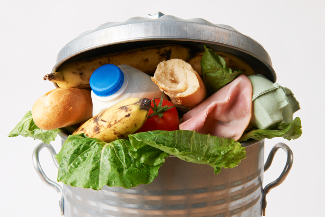Member State Page : Netherlands
Last updated on the 29/09/2023

Per capita: 161 kg in 2020
In total: 2 811 000 tonnes in 2020
In total: 2 586 744 tonnes in 2021

Primary production: 463 045 tonnes in 2020 Processing and manufacturing: 1 million tonnes in 2020
Retail and other distribution of food: 209 805 tonnes in 2020
Restaurants and food services: 83 035 tonnes in 2020
Households: 1 million tonnes in 2020

Halve food waste by 2030 and reduce food losses
Target
In several policy documents, the Dutch government has confirmed its commitment to achieve the Sustainable Development Goal Target 12.3 to halve per capita food waste at the retail and consumer level by 2030, and reduce food losses along the food production and supply chains.
Measure
The first national monitor on total food waste in the Dutch food supply chain was published in 2009 and it has been updated annually. The Ministry of Agriculture, Nature and Food Quality commissions the national monitoring, which is done by the Wageningen Food and Biobased Research Institute. The most recent data from 2018 indicate an average of 123 kilos of food waste per capita (minimum 96 kilos and maximum 149 kilos). The total amount of food waste has on average declined by 6 kilos per capita per year. This monitor does not include data from households.
There is a separate monitor on households’ food waste in the Netherlands, which is repeated every 3 years. Since the first monitoring carried out in 2010, a reduction of 29% has been achieved. In 2010, 48 kilos of food were wasted per person, decreasing to 41.2 kilos in 2016 and to 34.3 kilos in 2019. There has been a particularly strong reduction in the wastage of bread, dairy produce, fruit and vegetables, although these food types still remain among the most discarded products by consumers. In addition, a lower volume of drinks was poured away via the sink or toilet (45.5 litres of fluid per person in 2019, as compared to 57.3 litres in 2016).
In 2018, the Netherlands focused on collecting food waste data from the retail sector, as well as information on the amount (kilos) of sold food per product group and destinations, covering large Dutch supermarkets (83.8% net turnover from the whole market share in 2018). The results of the study showcased that:
- potatoes, vegetables and fruit have the highest contribution to supermarket food waste (34.5%), followed by bread and pastry (31.5%) dairy, eggs and chilled convenience products (13.3%);
- the total food waste accounts for 1.7% of the amount sold;
- the main waste destinations are biogas, composting and animal feed; and
- 5-10 product groups are responsible for 80-90% of food waste.
As regards the ‘out-of-home’ sector, researchers prioritised measurement activities on the hospitality sector, restaurants, companies, fast services, institutions and fuel stations. A food waste challenge was organised for restaurants. Regarding company catering, previous studies showed that display waste levels are the most significant, whereas more recent studies revealed that kitchen waste is almost comparable to the former and should not be neglected when collecting data.
In relation to other sectors of the food supply chain, Wageningen runs questionnaires among primary producers and fruit and vegetable trade organisations, and they have also developed sector specific measurement templates with 1-2 companies, which are representative for the sector.
The Netherlands estimates food losses in the primary sector based on an existing database.
Act
Combating food waste is a priority for the Dutch government, who actively collaborates with actors across the food supply chain (companies, research and non-governmental organisations) to reduce and prevent food waste through the Food Waste Free United Foundation voluntary agreement. Its signatories are committed to achieving the Sustainable Development Goal Target 12.3. The government facilitates and supports actions in this field and regularly reports to the parliament on the implementation of its food waste prevention agenda. The focus of the Dutch policy regarding food waste is on (1) preventing the occurrence of food waste (2) minimizing the amount of food waste and (3) using the food surplus that occurs according to the food use hierarchy. Actors in the food supply chain are encouraged and stimulated to use this hierarchy in order to give the highest value to their secondary resources. The Foundation started off as the ‘Taskforce Circular Economy in Food’, established in 2017 under the EU-funded REFRESH project to shape the national food waste prevention agenda.
The mission of Food Waste Free United Foundation is to be a catalyst for the transition to a food system without waste and food chains in which raw materials are retained in an efficient and effective manner. The members of the voluntary agreement inspire, activate and connect entrepreneurs in the food chain and consumers, in order to reduce food waste. The Foundation contributes to the national food waste prevention agenda by:
- Monitoring progress;
- Joining forces to combat food waste across the food supply chain;
- Joining forces to combat food waste by consumers;
- Changing the rules.
The climate agreement introduced a number of measures to strengthen the Food Waste Free United Foundation voluntary agreement. Measures include the provision of a yearly budget of €1 million to help increase the reach and impact of food waste prevention awareness campaigns aimed at consumers and companies, as well as commitments from signatories of the voluntary agreement to actively engage 80% of their respective members in the work of the Foundation.
The Dutch Alliance on Sustainable Food established in 2013 brings together six branch organisations covering the whole food supply chain (excluding consumers) and has a strong focus on preventing and reducing food waste and reusing secondary resources. The Dutch government works together with the alliance, increasing synergies between its members and other actors (e.g. the Dutch Association of Food Banks).
In order to save surplus food from the catering industry, festivals and exports during the Covid-19 pandemic, an online business-to-business marketplace has been established to give food a valuable destination. The online B2B Marketplace allows the reporting of available food quantities, linking supply and demand, crowdsourcing solutions. The latter means that for predicted large flows without demand, solutions are sought within the network of companies. Other initiatives have also been implemented to facilitate the recovery and redistribution of surplus food (e.g. Fruit & Veggie Brigade, Soupalicious), including an online solution put in place for the HORECA sector (InStock Market). A digital platform for structural and large-scale recovery, processing and redistribution of surplus food is currently being developed in the Netherlands, based on learnings from the online B2B Marketplace developed during Covid-19.
In order to raise awareness about food waste among consumers, the Food Waste Free United Foundation and the Ministry of Agriculture, Nature and Food Quality launched in 2019 a national campaign called ‘How #waste free are you?’ (#Verspillingsvrij), giving practical tips on how to prevent food waste at home. The campaign aims to reach 5 million consumers and to inspire 30% of the Dutch population to actively reduce their food waste. The campaign is supported by a large group of media influencers and members of the Foundation and its main target are families with young children, being the group that discards most food. Becky the mascot became the face of the campaign in order to further incentivise people to take action against food waste.
The consumer campaign continued in 2020 with date marking as its main theme, in order to help consumers distinguish between ‘use by’ and ‘best before’ dates and to offer them clear advice on how to treat these two different date marks, which could help them avoid about 5 kilos of food waste every year.
As a part of the campaign, every year during Waste-Free Week consumers are encouraged to be #Waste-free and to sign up and participate in various related challenges. Many actors are involved in carrying out actions during the week, helping consumers waste less food by, for example, distributing tools such as measuring cups, fridge and freezer stickers, as well as informative materials on the issue. Related activities are also carried out in schools.
The theme of reducing food waste is included in existing educational materials, namely Taste Lessons, ‘Know what you eat’ and the Citizenship Course, being linked to education about healthy nutrition, food safety, origin and sustainability. Specific challenges are held in which students in secondary and higher vocational education are encouraged to come up with practical solutions to the issue of food waste.
Companies can receive financial support for tailor-made advice to cut food waste in their operations, by applying to the voucher scheme launched by the Ministry of Agriculture, Nature and Food Quality in 2019 and managed by Wageningen University & Research. Companies requesting a new or innovative solution can apply for a voucher of up to a maximum of €15,000 ex. VAT, where they contribute at least the same amount in cash. The solutions / innovations found are then actively shared with other companies.
In 2021, the first loan that rewards the reduction of food waste with lower interest rates was granted by the Dutch financial institution Rabobank.
In order to stimulate innovation and public-private partnership projects, Top Consortia for Knowledge and Innovation (TKI) have been set up within nine top sectors, including in the agri-food sector. In TKIs, entrepreneurs and scientists look for ways to market innovative products and services as well as solutions against food loss and waste.
Relevant resources
Links
